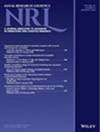Penetrating a market with local‐content and pricing decisions: Implications for a multinational firm in the competition with a local firm
IF 2.1
4区 管理学
Q3 OPERATIONS RESEARCH & MANAGEMENT SCIENCE
引用次数: 0
Abstract
Abstract The internationalization of production requires multinational firms to determine a local content rate for their products made and sold in a foreign country. In this paper, we investigate the impact of a government's local content requirement (LCR) on the local content rate and pricing decisions of a multinational firm who competes with a local firm in a market. In an emerging market, the multinational firm increases his local content rate to comply with an LCR if the LCR involves a moderate threshold and a sufficiently large penalty tariff rate. Although a small penalty tariff rate cannot induce the multinational firm's compliance, a larger penalty tariff leads the firm to adopt a higher local content rate. When the multinational firm complies with the LCR, a higher LCR threshold or penalty tariff rate shifts away the multinational firm's demand and profit but may not benefit the local firm if the two firms' price competition is fiercer than their quality competition. In addition, if the two firms' quality competition is fiercer than their price competition, a large LCR threshold may still not benefit the local firm. In contrast, in a developed market, the multinational firm should increase his local content rate as the quality‐cost tradeoff ratio increases. The LCR plays the same effect on the multinational firm as that in an emerging market, whereas its effect on the local firm still depends on the relative intensity of the two firms' price competition versus quality competition, but under reverse conditions.以本地内容和定价决策渗透市场:对跨国公司与本地公司竞争的启示
生产的国际化要求跨国公司为其在国外生产和销售的产品确定一个本地含量率。本文研究了一国政府的本地含量要求(LCR)对跨国公司在市场上与本地企业竞争时的本地含量率和定价决策的影响。在新兴市场中,如果LCR包含适度的门槛和足够大的惩罚性关税税率,跨国公司就会提高其本地含量率以遵守LCR。虽然较低的惩罚性关税税率不能促使跨国公司遵守,但较高的惩罚性关税会导致跨国公司采用较高的本地含量率。当跨国公司遵守LCR时,较高的LCR门槛或惩罚性关税税率会转移跨国公司的需求和利润,但如果两家公司的价格竞争比质量竞争更激烈,则可能不利于当地公司。此外,如果两家公司的质量竞争比价格竞争更激烈,那么较大的LCR门槛可能仍然不利于当地公司。相反,在发达市场,跨国公司应该随着质量-成本权衡比率的增加而提高其本地含量率。LCR对跨国公司的影响与对新兴市场的影响相同,而其对本地公司的影响仍然取决于两家公司价格竞争与质量竞争的相对强度,但在相反的条件下。
本文章由计算机程序翻译,如有差异,请以英文原文为准。
求助全文
约1分钟内获得全文
求助全文
来源期刊

Naval Research Logistics
管理科学-运筹学与管理科学
CiteScore
4.20
自引率
4.30%
发文量
47
审稿时长
8 months
期刊介绍:
Submissions that are most appropriate for NRL are papers addressing modeling and analysis of problems motivated by real-world applications; major methodological advances in operations research and applied statistics; and expository or survey pieces of lasting value. Areas represented include (but are not limited to) probability, statistics, simulation, optimization, game theory, quality, scheduling, reliability, maintenance, supply chain, decision analysis, and combat models. Special issues devoted to a single topic are published occasionally, and proposals for special issues are welcomed by the Editorial Board.
 求助内容:
求助内容: 应助结果提醒方式:
应助结果提醒方式:


